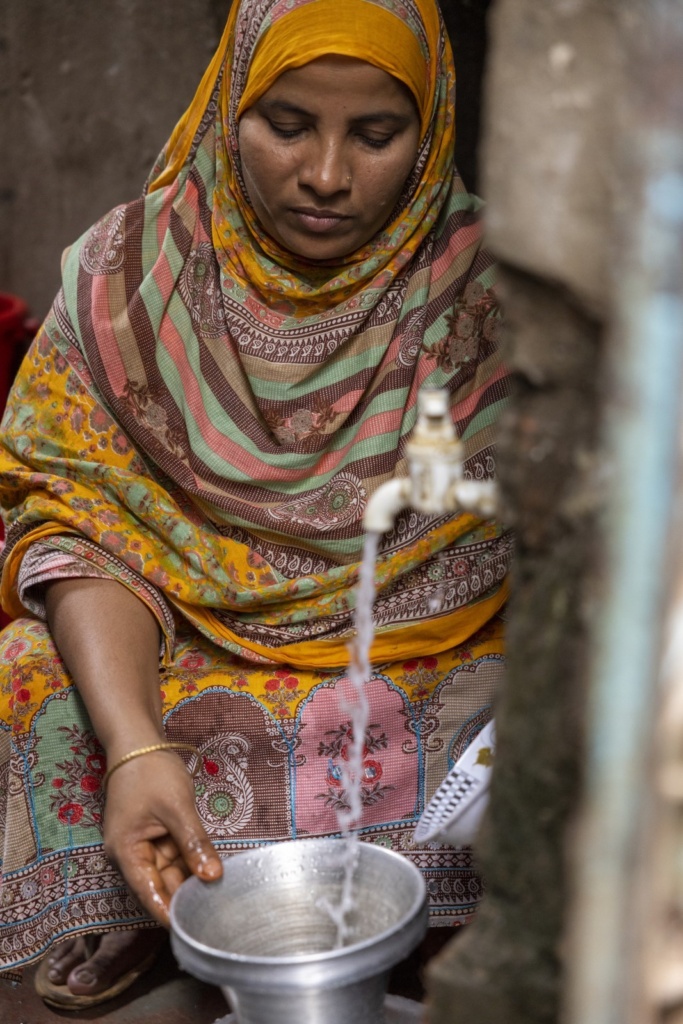In the heart of northwest Dhaka, lies Duaripara, one of the largest informal settlements in the region. Here, amidst the maze of narrow alleys and tightly packed homes, a remarkable story of resilience and community leadership unfolds. At the center of this story is Sahana, a dedicated member of the community water, sanitation, and hygiene committee (CWC).

Since 2015, Sahana has been a beacon of hope and strength in Duaripara. As one of the 25 elected members of the CWC, she has been instrumental in driving change. This committee hasn’t just improved local sanitation and hygiene practices; it has tackled the myriad structural and environmental challenges that come with life in an informal settlement. From masonry and carpentry to waste management, the training Sahana and her team have received reflects their unwavering commitment to their community.
In March 2023 a fire swept through Duaripara devastating the community. In informal settlements, where homes are closely packed and often built from flammable materials, fires are catastrophic. Firefighters are often unable to respond quickly due to narrow streets and a lack of hydrants or other water sources. From the moment the community first smelt smoke it was a real test of their safety readiness and resilience – as flames leapt from house to house, Sahana’s leadership and CWC training became a lifeline.
Sahana recalled seeing smoke billowing out into the common yard that she shared with a few other households; “At first, I thought it was a small fire caused by people burning waste.” Soon after a girl from the community ran in with the news that some nearby houses were on fire. Sahana took action immediately.
With a few other CWC members, Sahana rushed to evacuate residents whose homes were either on fire or nearby. “Women were rolling on the street, crying and screaming,” CWC member Morjina says. Due to the smoke, the CWC members could not enter the burning houses. The fire engine arrived on the scene but could not enter because of the narrow alley. According to Sahana, a member of the fire response team dashed inside a burning house to rescue a baby who was alone at home while her sister was in school. Other people in the community threw sand, sackcloth, and water into the fire to try and put it out. Five housing units in a row were eventually razed as a result of the damage they sustained.
“Everything was burned; that tree also turned to ashes. People were unable to save their money and belongings,” Sahana recalls. Due to the people’s quick actions, the fire did not spread to other houses, she says. If a pregnant woman were inside the burning house, Sahana thinks there would be no chance of rescue. “Whenever we see a fire, we panic. I tell people not to panic. The priority is to evacuate women, older people and children.” She adds, “As CWC members, our responsibility is to check in on people. We should help somebody in distress and vice versa. The things that we learned, we want the same training for those who will replace us in the CWC. We want a group that is as active as we are.”
In the aftermath of the fire, the true spirit of Duaripara emerged. The community rallied together to rebuild what was lost as well as to raise concerns about issues like damaged roads, insufficient toilets and a shortage of drainage systems. Sahana and the CWC, in partnership with various NGOs, spearheaded the recovery efforts. Their work led to the construction of 17 new sanitation facilities and improvements in local infrastructure such as the construction of a 204ft walkway and a 150ft drainage system, fortifying the community against future adversities.

But Sahana’s vision extends beyond immediate disaster response. She is a passionate advocate for long-term solutions to the challenges her community, particularly women in the community face. She tackles critical issues like child marriage, having been married, herself at age 13, and champions causes such as menstrual hygiene, striving to enhance the well-being, education, safety and dignity of women and girls in Duaripara.
Sahana’s story is a powerful testament to the potential within informal settlements when communities are empowered to take control of their destinies. Her efforts, supported by organisations like Habitat for Humanity, highlight the crucial role of community-based leadership in fostering resilience and advocating for systemic change. Sahana’s work ensures safer, healthier living conditions for all.
“Home is a sanctuary where I can relax and live my life on my own terms.”
– Sahana

Through the “Building Resilient Urban Slum Settlements” project works with communities in Dhaka including Duaripara to identify the hazards and risks of living in an informal settlement, then supports each community to address their prioritised needs by providing resources and training. In these informal settlements, those with leadership skills are elected by fellow residents to be members of the Community Water, Sanitation and Hygiene Committee. The committee takes the lead in facilitating the community’s access to basic services and training by coordinating with local government and nongovernmental organisations.
The “Building Resilient Urban Slum Settlements” project in Dhaka, Bangladesh receives support from the Australian Government through the Australian NGO Cooperation Program (ANCP) and is in partnership with our implementing partner Habitat for Humanity Bangladesh.




